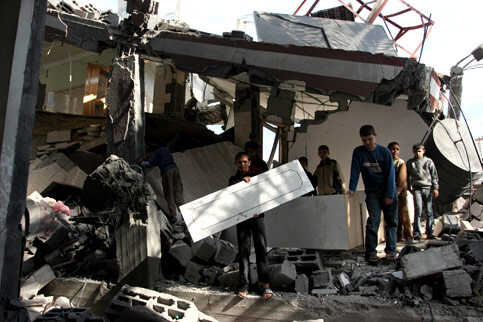Center for Constitutional Rights 7 May 2007

Palestinians inspect the remains of the house belonging to a Hamas activist after it was hit in an Israeli air strike in the northern Gaza Strip, 16 November 2006. The Israeli air force struck five different buildings around the Gaza Strip during the night, in retaliation for a Qassam rocket that killed a woman in the Israeli town of Sderot. (Wesam Saleh/MaanImages)
On May 2, 2007, a federal judge dismissed the Center for Constitutional Rights’ case against senior Israeli official Avi Dichter for his role in dropping a one-ton bomb on a Gaza City apartment building, killing 15 Palestinians and injuring more than 150 others.
The lawsuit, Matar v. Dichter, was filed against Avi Dichter, the former Director of Israel’s General Security Service (GSS), on behalf of the Palestinians who were killed or injured in the bombing. The attack occurred around midnight on July 22, 2002, when the Israeli Defense Forces (IDF) dropped a one-ton bomb on al-Daraj, a residential neighborhood in Gaza City in the Occupied Palestinian Territory. It killed seven adults and eight children, including plaintiff Ra’ed Matar’s wife and their three young children and plaintiff Mahmoud Al Huweiti’s wife and two of their young sons. It also injured more than 150 others, including plaintiff Marwan Zeino, whose spinal vertebrae were crushed.
The case charges Dichter with war crimes, extrajudicial killings, and crimes against humanity for his participation in the decision to drop the bomb on the residential neighborhood and alleges that GSS provided the necessary intelligence and final approval to implement the attack.
In dismissing the case, Judge Pauley of the Southern District of New York found that Dichter had immunity under the Foreign Sovereign Immunities Act (FSIA) because, according to the Israeli government, Dichter was acting in the course of his official duties. The U.S. government submitted a statement of interest in the case arguing that Dichter should be immune for official acts, including war crimes. In its submission, the U.S. government reiterated its “serious objections” to the attack, which the Bush administration had previously condemned as a “deliberate attack against a building in which civilians were known to be located.”
Said CCR senior attorney Maria LaHood, “This decision is a big disappointment. The court found a government official immune for war crimes because the Israeli government approved of his acts, and because the U.S. executive might be embarrassed if the case proceeded. Failing to enforce the law against officials from governments who stand by their human rights violations permits some of the worst abuses to go unpunished.”
Related Links